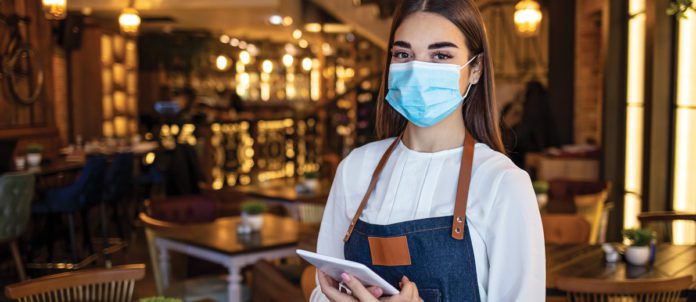It’s long been held that one of the key traits of a good leader is vision; it’s the foundation of imagination, direction and planning. But what happens when vision collides with chaos? Leaders rarely forecast — or prepare for — a crisis, and few foresaw a crisis such as COVID-19. In the surprisingly insightful words of ex-heavyweight champ Mike Tyson, “Everybody has a plan until they get punched in the mouth.”
For most companies, the pandemic punched hard, and, in the face of strict restrictions, lockdowns and shut-downs, they were forced to re-shuffle priorities and grapple with issues they never had before, such as mental health. And, according to Bruce McAdams, associate professor at the University of Guelph’s School of Hospitality, Food and Tourism Management, leaders were
ill-equipped to handle it. Last year, the university surveyed industry leaders about their comfort and confidence in dealing with their employees’ mental health. “We found only 15 per cent of leaders had any training in mental-health issues at all and their level of comfort ranged significantly,” he says. “But what they all agreed on is that it had become a bigger part of their job.”
And will continue to be. McAdams predicts the industry will endure continued financial stress for “a significant amount of time,” while contending with operational changes, public-health restrictions and perhaps the biggest — staff shortages. “We came into this pandemic with a labour crisis, and it’s risen coming out. We weren’t prepared going in and we’re going to be even worse off trying to lead a healthy and productive work force through recovery. Our industry is under a microscope, whether it’s sick days or mental health or working conditions in general, so it’s a time to really step up our leadership skills.”
Those skills, common to any good leader but ever more vital in a crisis, include integrity, honesty, transparency, trustworthiness, courage, decisiveness, responsiveness, clear communication and, when dealing with mental-health issues, compassion, empathy, accessibility and being a good listener. Oh, and having that plan, even at the risk of a punch in the mouth. McAdams says employees need to know you have things under control, that you’re, well, leading. But you first need to have those employees, many of whom were laid off or simply left the industry in frustration. McAdams says luring them back will require the obvious: better pay, better working conditions, flexible schedules, benefits, and mental-health supports.
Derek Doke, CEO/founder of Franworks Group, a Calgary-based restaurant franchising company that includes names such as Original Joe’s, State and Main and Elephant and Castle, says the pandemic has compelled him to take a closer look at all aspects of his business, including ways to address compensation beyond an hourly wage, perks and bonuses in light of increased psychological struggles. “Top of mind for us is, do we look at ways we can support staff with perhaps counselling, options that help people live more balanced lives?”
Doke says increased engagement has allowed him to regularly take the emotional temperature of his staff. “Thankfully, technology helps with that. We’re all on video [conferencing] these days, and it’s really helped with managing through the stress of it all. It’s gelled us as both a corporate team and connected us to the store level in ways that we couldn’t before, especially if you can’t be there physically. Making sure we’re checking in, connecting one-on-one is important for not only retention but also peace of mind and health.”
McAdams agrees. “Research shows there’s a link between levels of employee engagement and productivity, retention and customer focus,” he says. “So, you need engaged employees and, in this day, and age you better be providing them a psychologically safe environment, one that says you’re not going to be punished or humiliated for speaking up with ideas, questions, concerns or admitting mistakes.”
McAdams says he talks to operators every day who are so desperate for staff that they’re hiring people on the spot, only to lose them to another company the next day. “You have to be creative, you have to differentiate yourself, you have to step up and understand that the cost of turnover is incredibly high. In full and quick-service, you can’t create sales without people.”
For Franworks, that means re-engineering workflow by integrating more technology, such as upgraded kitchen equipment and partner-communication tools that will free up staff to interact more with guests. He also believes streamlining and simplifying operations will help prepare the company should there be another crisis. “We have to get away from complexity in all corners of our business in order to be prepared for another crisis that involves a lot of change and stress.”
Ultimately, McAdams says the restaurants that will make it through the pandemic relatively unscathed will be those with stellar chefs and deep pockets. “But they’re one per cent of restaurants in Canada. The others that will survive and thrive are the ones that focus on leadership. Everyone’s focusing right now on sales, on costs, on their bank balances, and I feel for them. But from a business-case standpoint, focusing on your leadership skills so that you can create a great internal environment is going to be more important than ever. I’m optimistic in the long term, but I think there’s going to be pain.”
Written by Robin Roberts

















